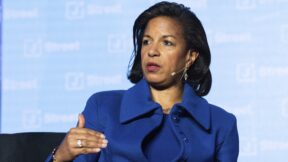Is The Judge Who Overturned Proposition 8 Gay? Does It Matter?
 As Melissa Block interviewed Karen Grigsby Bates Wednesday on National Public Radio’s All Things Considered, Bates made a startling statement that may have caused many listeners to drive off the road. In describing Judge Vaughn Walker, who had just found a ban on same-sex marriage unconstitutional, she said:
As Melissa Block interviewed Karen Grigsby Bates Wednesday on National Public Radio’s All Things Considered, Bates made a startling statement that may have caused many listeners to drive off the road. In describing Judge Vaughn Walker, who had just found a ban on same-sex marriage unconstitutional, she said:
He is generally considered to be very thoughtful, very thorough. And he’s gay. He’s gay and out. And it doesn’t seem to be an issue for anybody, including the supporters of Proposition 8, because when it was announced that Judge Walker was the judge who’d been assigned this case, they did not ask that he be recused from it.
As I said on a post at the National Lesbian and Gay Journalists Association blog, what was so surprising about that statement is Walker’s being gay and open about it was reported as a fact that, as far as I can tell, has never been established. And NPR isn’t alone. On ABC’s Good Morning America, Walker is also described as openly gay in a report by Terry Moran.
Sure, critics of the decision talk about. The Drudge Report prominently played up a story about Walker’s sexual orientation on the day of the ruling. Fox News even ran an analysis piece on their website the day of the ruling suggesting it was evidence of bias.
And Stephen Colbert may have settled the issue, saying “Arma-gay-don” has arrived since Walker is gay, like the judges on Project Runway.
| The Colbert Report | Mon – Thurs 11:30pm / 10:30c | |||
| How to Ruin Same-Sex Marriages | ||||
|
||||
The chatter, of course, is nothing new. In February, two San Francisco Chronicle columnists wrote about “the biggest open secret” in town: the unmarried 65-year old judge was gay and not exactly closeted about it. The New York Times used that story recently to bring up Walker’s sexual orientation, but avoided saying he was gay.
But hearing NPR report that Walker was “gay and out” was still shocking because so few reporters actually stated it as fact. People hint about it and there’s plenty of innuendo, but it appears the Chronicle’s outing of Walker has now largely turned into evidence without confirmation. Even Andrew Sullivan takes it as an issue of fact.
Lisa Keen, a long-time reporter in the gay press, wrote an analysis for the LGBT newspaper the Bay Area Reporter when the news first surfaced saying “various other reporters and gay people interested in the trial did openly discuss their belief that Walker is gay” during the time she was covering the trial but the “only evidence anyone offered, beyond the realm of ordinary rumor, was the claim that a third party had told them that they had seen Walker at a gathering of a local gay legal group.”
So where does that leave the press?
As I said before when talking about Elena Kagan for Mediaite, the question is why does it matter and is it newsworthy. It also raises an even more provocative question about what is “gay and out” and how do journalists describe it.
A gay judge needn’t avoid ruling on issues involving gay people because it is viewed as evidence of bias. African American jurists can rule on civil rights issues, Catholic jurists can rule on relgious liberty issues or abortion, and female jurists can rule on issues involving women’s rights without it being viewed as obvious bias.
But if people are discussing alleged bias and a judge’s sexual orientation, is then news? In this case, the answer is probably yes. It’s a newsworthy story and the mystery behind the judge’s sexual orientation is an issue being cited by critics and, well, it’s just really interesting. That makes it fair game for coverage.
It does not, however, require National Enquirer investigations and paid sources delving into Walker’s trash and personal life. It’s not THAT interesting of a story.
The story also raises a larger societal–and journalism ethics–question that is connected to the sticky issue of “outing.”
Judge Walker should need to hold a press conference or issue a press statement announcing his sexual orientation. He should be allowed to lead his life as he wants, attend the parties he wants, and even have male companions in public without needing to contact public relations guru Howard Bragman and appearing on the cover of People magazine.
There will hopefully come a time when public figures–or even private ones–aren’t badgered about their sexual orientation and they can just live their lives. This requires, of course, a certain candor from public figures who don’t actively work to hide their sexual orientation or refuse to bring it up.
But we don’t live in that world yet, so these issues are going to continue to arise likely with more frequency. People are going to be asked about sexual orientation, people are going to avoid answering, and journalists will still be left figuring out how to report it.
New: The Mediaite One-Sheet "Newsletter of Newsletters"
Your daily summary and analysis of what the many, many media newsletters are saying and reporting. Subscribe now!






Comments
↓ Scroll down for comments ↓